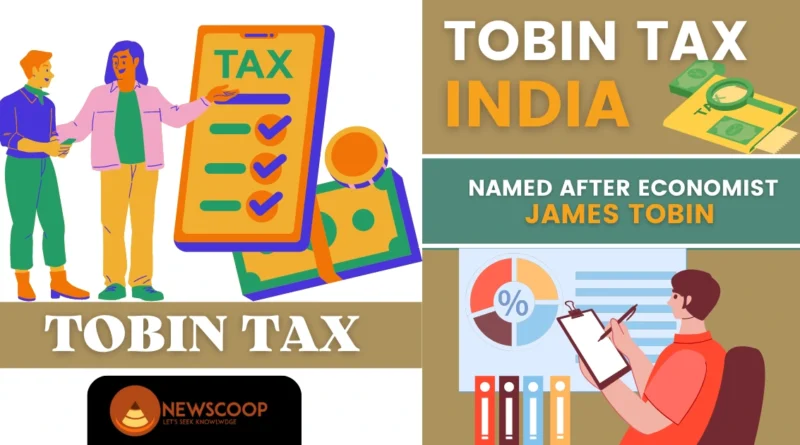Tobin Tax in India: Objectives & Background
The Tobin Tax, also known as the currency transaction tax or the Tobin Levy, is a proposed tax on foreign exchange transactions. The concept was initially put forth in the 1970s as a means to stabilize currency markets and generate revenue for international development initiatives. While the idea has been a subject of debate and criticism, it has gained renewed attention in recent years.
This article explores the Tobin Tax, its advantages, disadvantages, and objectives in relation to the UPSC examination, providing insights into the potential implications of this proposed tax on foreign exchange transactions.
What is Tobin Tax?
The Tobin Tax, named after economist James Tobin, is a proposed tax on financial transactions, particularly foreign exchange transactions. It aims to discourage short-term speculative trading and stabilize currency markets. The tax is often referred to as the Financial Transactions Tax (FTT) or colloquially the Robin Hood tax, as it is seen as a means to redistribute wealth from high-frequency traders and large financial institutions.
Example of Tobin Tax
Suppose there is a country called “Alpha” that wants to implement a Tobin Tax on foreign exchange transactions. Currently, traders can buy and sell currencies rapidly, taking advantage of small price fluctuations to make quick profits. This high-frequency speculative trading can lead to currency instability.
With the implementation of the Tobin Tax, a small fee would be levied on each foreign exchange transaction. For instance, let’s assume the tax rate is 0.1% of the transaction value. If a trader buys or sells $10,000 worth of a foreign currency, they would need to pay $10 as a Tobin Tax.
The purpose of this tax is to discourage short-term speculative trading by making it less profitable. The tax adds a cost to each transaction, reducing the incentive for traders to engage in rapid buying and selling of currencies. By doing so, the Tobin Tax aims to stabilize currency markets, discourage excessive speculation, and promote more sustainable and balanced trading practices.
Objectives
The objectives of the Tobin Tax are as follows:
- Stabilize currency markets.
- Reduce volatility in exchange rates.
- Discourage short-term speculative trading.
- Promote more sustainable and balanced trading practices.
- Generate revenue for public welfare programs.
- Address wealth inequality by redistributing financial resources.
- Deter excessive speculation and reduce the risk of financial crises.
Background
The Tobin Tax was proposed in response to the increased movement of funds between countries in the early 1970s, which posed a threat to global economic stability. This period marked the transition from fixed exchange rates under the Bretton Woods system to flexible exchange rates.
With the adoption of flexible exchange rates, the currency market became more open and free, leading to a surge in short-term currency speculation. This speculative trading resulted in economic costs for countries involved in currency exchange.
In light of these challenges, the economist James Tobin proposed the Tobin Tax as a solution. The tax aimed to discourage and reduce the impact of short-term currency speculation, thereby stabilizing global currency markets.
The idea gained acceptance among various European countries, recognizing the need to address the negative consequences of excessive speculative trading. By implementing the Tobin Tax, these countries sought to discourage short-term currency speculation and foster stability in currency markets worldwide.
Tobin Tax in India
India has implemented a variant of the Tobin Tax known as the Securities Transaction Tax (STT). Introduced in 2004, the STT is levied on transactions involving securities listed on stock exchanges and mutual funds.
The tax is imposed on both buyers and sellers and aims to generate revenue for the government while discouraging excessive speculation in the Indian securities market. The STT is designed to provide a source of income for the government and regulate securities trading, contributing to the overall stability of the financial system in India.
Also Read: Minimum Alternate Tax
Advantages & Disadvantages of Tobin Tax
The following are the advantages of tobin tax:
- Provides a gestation period for governments to counter destabilizing capital flows.
- Slows down the entry and exit of capital, promoting stability.
- Generates revenue for social development purposes.
- Discourages short-term speculative capital and excessive volatility.
- Reduces the risk of financial crises and promotes more sustainable trading practices.
The following are the disadvantages of tobin tax:
- Potential impact on job opportunities in the financial sector.
- Decreased liquidity of assets.
- Increased investment costs for investors.
- Potential decrease in returns for various funds, such as pension funds, as banks may pass the tax cost to customers.
- Difficulty in achieving global implementation, as tax evasion and circumvention are possible.
Conclusion
In conclusion, the Tobin Tax is a proposed tax on foreign exchange transactions with the aim of stabilizing currency markets and discouraging speculative trading. While it has potential benefits, concerns exist regarding its impact on jobs, asset liquidity, investment costs, and global implementation. Further evaluation is necessary to assess its effectiveness and consequences on financial systems and economies.
Thank You!

